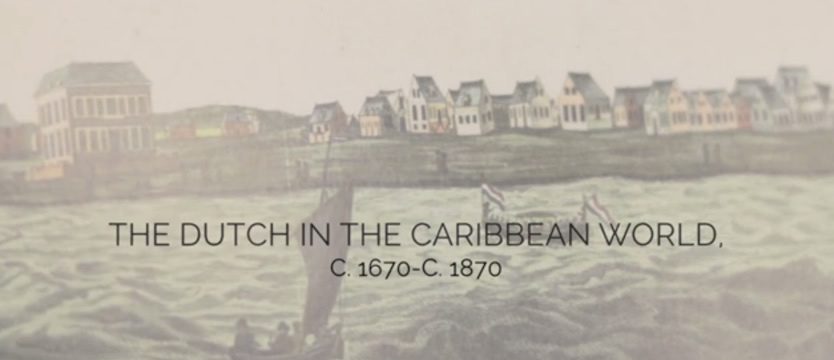This project offers a research tool in two parts: a) a guide to archival sources on the Dutch colonies in the Caribbean World and b) a summary of the relevant laws and regulations of the period.
After experiencing many wars, the Dutch possessions in the West Indies entered a much more quiet period from the 1670s onwards. In the Caribbean the Dutch possessions concerned a few islands of the Antilles (Curaçao, Aruba, Bonaire, St. Martin, St. Eustatius and Saba) and some of the great estuaries on the Wild Coast, including the rivers nearby (Suriname, Berbice, Essequibo and Demerara). Within these colonies a whole social fabric of multicultural relations took shape. The society became rather stratified, and social status became defined by clear conventions about class, colour and religion. The phenomenon of slavery played a central role in this formation. Slavery itself was not abolished until 1863, but under government supervision the former slaves in Suriname still had to carry out paid work on a plantation of their own choice for a period of ten years. The period between 1670 and 1870 can be called the ‘classic era’ of the Dutch colonial presence in the Caribbean world. As a result of the wars in the wake of the French Revolution, the colonies of Berbice, Essequibo and Demarara were lost to the Dutch by treaty in 1814, after a long British occupation, to become British Guyana. A separate description of the government administration and justice can be consulted in Han Jordaan and Marijcke Schillings,
‘Organisatie van bestuur en rechtspraak in de Nederlandse Caraïbische wereld’.
The guide to archival sources covers collections in the Netherlands, the United Kingdom, Curaçao, Suriname and Guyana, especially those that might contain information about slavery and multicultural relations. The summary of the relevant laws and regulations is mainly based on the
published West-Indische Plakaatboeken, edited by J.Th. de Smidt in cooperation with J.A. Schiltkamp and T. van der Lee, and the nineteenth-century Gouvernementsbladen and Publicatiebladen for Suriname and the Antilles. A
West-Indisch Plakaatboek for Berbice, Essequibo and Demarara is not yet available. An in extenso digital version is to be published as a separate project by the Huygens Institute for the History of the Netherlands (Huygens ING) in 2014.The project was conducted between 2006 and 2013 as a cooperation between Huygens ING and KITLV (Royal Netherlands Institute for Southeast Asian and Caribbean Studies). The work was carried out by Marijcke Schillings, Han Jordaan, Henk-Jan van Dapperen and Gerrit Knaap. The web research tool was developed by Huygens ING. Bureau Aramis corrected the English text. In the broader framework of this project, Han Jordaan completed and defended his PhD thesis,
Slavernij en vrijheid op Curaçao; De dynamiek van een achttiende-eeuws Atlantisch handelsknooppunt (Leiden, 2012).From the viewpoint of the KITLV, the archival guide section of the project is a more detailed follow-up of the Atlantic World and the Dutch project. For Huygens ING, the Dutch in the Caribbean World was developed alongside another project, namely the
Repertorium van Nederlandse Zendings- en Missie-archieven 1800-1960.
Abbreviations
The first release of this project is dated 1 August 2013. Questions or remarks? Please send them to Marijcke Schillings.


